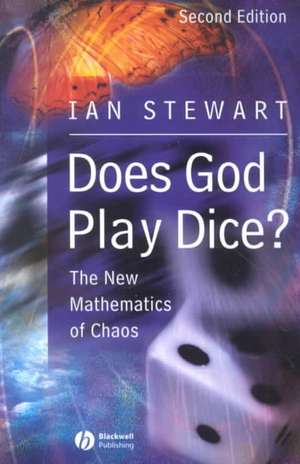Does God Play Dice?: The New Mathematics of Chaos
Autor Ian Stewarten Limba Engleză Paperback – 3 ian 2002
Preț: 187.82 lei
Nou
Puncte Express: 282
Preț estimativ în valută:
35.95€ • 37.05$ • 30.35£
35.95€ • 37.05$ • 30.35£
Carte tipărită la comandă
Livrare economică 04-18 martie
Preluare comenzi: 021 569.72.76
Specificații
ISBN-13: 9780631232513
ISBN-10: 0631232516
Pagini: 416
Dimensiuni: 135 x 219 x 30 mm
Greutate: 0.53 kg
Ediția:2nd Edition
Editura: John Wiley and Sons Ltd
Colecția Wiley–Blackwell
Locul publicării:Chichester, United Kingdom
ISBN-10: 0631232516
Pagini: 416
Dimensiuni: 135 x 219 x 30 mm
Greutate: 0.53 kg
Ediția:2nd Edition
Editura: John Wiley and Sons Ltd
Colecția Wiley–Blackwell
Locul publicării:Chichester, United Kingdom
Public țintă
general readers interested in philosophy, physics, mathematicsDescriere
"You believe in a God who plays dice, and I in complete law and order." — Albert Einstein The science of chaos is forcing scientists to rethink Einstein′s fundamental assumptions regarding the way the universe behaves. Chaos theory has already shown that simple systems, obeying precise laws, can nevertheless act in a random manner. Perhaps God plays dice within a cosmic game of complete law and order. Does God Play Dice? reveals a strange universe in which nothing may be as it seems. Familiar geometrical shapes such as circles and ellipses give way to infinitely complex structures known as fractals, the fluttering of a butterfly′s wings can change the weather, and the gravitational attraction of a creature in a distant galaxy can change the fate of the solar system. This revised and updated edition includes three chapters on the prediction and control of chaotic systems. New information regarding the solar system and an account of complexity theory is also incorporated. It is a lucid and witty book which makes the complex mathematics of chaos accessible and entertaining.
Textul de pe ultima copertă
"You believe in a God who plays dice, and I in complete law and order." — Albert Einstein The science of chaos is forcing scientists to rethink Einstein′s fundamental assumptions regarding the way the universe behaves. Chaos theory has already shown that simple systems, obeying precise laws, can nevertheless act in a random manner. Perhaps God plays dice within a cosmic game of complete law and order. Does God Play Dice? reveals a strange universe in which nothing may be as it seems. Familiar geometrical shapes such as circles and ellipses give way to infinitely complex structures known as fractals, the fluttering of a butterfly′s wings can change the weather, and the gravitational attraction of a creature in a distant galaxy can change the fate of the solar system. This revised and updated edition includes three chapters on the prediction and control of chaotic systems. New information regarding the solar system and an account of complexity theory is also incorporated. It is a lucid and witty book which makes the complex mathematics of chaos accessible and entertaining.
Cuprins
Preface to the Second Edition. Prologue: Clockwork or Chaos? 1 Chaos from Order. 2 Equations for Everything. 3 The Laws of Error. 4 The Last Universalist. 5 One–way Pendulum. 6 Strange Attractors. 7 The Weather Factory. 8 Recipe for Chaos. 9 Sensitive Chaos. 10 Fig–trees and Feigenvalues. 11 The Texture of Reality. 12 Return to Hyperion. 13 The Imbalance of Nature. 14 Beyond the Butterfly. 15 Von Neumann′s Dream. 16 Chaos and the Quantum. 17 Farewell, Deep Thought. Epilogue: Dicing with the Deity. Further Reading. Illustration Acknowledgements. Index.
Recenzii
"A book well worth reading and a valuable contribution to the literature on chaos" ( New Scientist ) "For those who have even rudimentary mathematical knowledge, for teachers and for lively–minded school and university students, Stewart give a valuable insight into the innards of chaos" ( The Times Higher Education Supplement ) "A fine introduction to a complex subject" ( Daily Telegraph )
Notă biografică
Ian Stewart is Professor of Mathematics at the University of Warwick and a Fellow of the Royal Society. He is an active research mathematician with over 140 published papers, and has written or co–authored numerous books including The Collapse of Chaos (1994), Nature′s Numbers (1995), Figments of Reality (1997), Life′s Other Secret (1998), The Science of Discworld (1999), and Flatterland (2001). His awards include the 1995 Faraday Medal of the Royal Society and the 2000 Gold Medal of the Institute of Mathematics and Its Applications.
